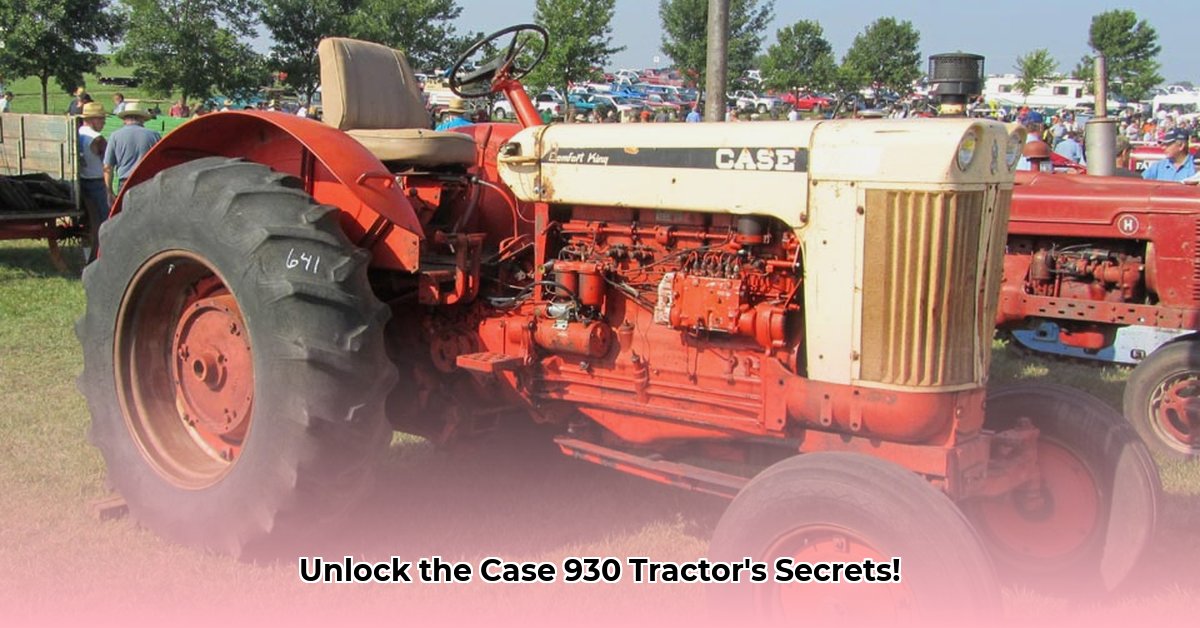
The J.I. Case 930, produced from 1960 to 1969, stands as a testament to robust agricultural engineering. This comprehensive guide delves into its specifications, historical context, and restoration considerations, appealing to both seasoned enthusiasts and those with a general interest in classic farm machinery. We’ll examine its powertrain, hydraulics, and the distinctive Comfort King variant, comparing it to contemporaries and exploring its lasting impact. For help finding serial numbers, check out this Case Serial Number Lookup.
Engine and Powertrain: The 930's Workhorse Heart
The Case 930’s power originates from a 6.6-liter, six-cylinder diesel engine—a powerhouse for its era. While precise figures vary slightly depending on testing methodology, expect around 80 PTO horsepower (power at the power takeoff shaft) and approximately 70 drawbar horsepower (power used for pulling implements). These numbers provided substantial pulling and operational power for a tractor of its time. How did these figures compare to competitors? A review of contemporaneous agricultural publications provides valuable context, revealing the 930's position within the competitive landscape. The tractor featured a straightforward 6-speed transmission (six forward, one reverse), simplifying operation and maintenance. This simple, efficient design was a key factor in its enduring popularity.
Hydraulics and Other Systems: Precision and Control
The Case 930 employed a dual-control hydraulic system, offering effective implement control despite lacking the advanced electronics found in modern counterparts. Power steering, a significant improvement in operator comfort and maneuverability for its time, was a standard feature. These systems, while less complex than modern designs, provided the farmers of the day with improved precision and reduced strain during operation. This design represented a step forward in agricultural technology during its era.
Comfort King (CK) Variant: Enhanced Operator Experience
The Comfort King (CK) version of the 930 prioritized operator comfort. Its most notable upgrade was a larger fuel tank; while sources vary, the capacity increased from approximately 30 gallons in the standard model to around 48 gallons in the CK version. This seemingly minor difference significantly reduced refueling stops during long workdays, improving efficiency and reducing downtime. The CK upgrade exemplifies a growing industry trend that emphasized improved operator wellbeing.
Key Case 930 Tractor Specs: A Summary Table
The following table summarizes key specifications, acknowledging minor discrepancies that may arise from different sources and testing methods.
| Feature | Value Range (Approximate) | Notes |
|---|---|---|
| Engine | J.I. Case 6.6L 6-cylinder diesel | Consistent across most reliable sources. |
| Fuel Tank Capacity (US Gallons) | 30 (Standard), 48 (Comfort King) | Variations may be due to differing measurement methods or rounding. |
| Horsepower (PTO) | ~80 hp | Significant variations depending on testing conditions are to be expected. |
| Horsepower (Drawbar) | ~70 hp | Variability is due to differing testing conditions and methodologies. |
| Transmission | 6-Speed (6 forward, 1 reverse) | The basic transmission layout is uniformly reported across sources. |
Historical Context: A Legacy of Innovation
Produced between 1960 and 1969, the Case 930 represents a significant era in agricultural machinery. It cleverly balanced performance and affordability, reflecting the technological advancements and economic realities of its time. While lacking the advanced electronics of present-day models, its simplicity, rugged dependability, and significant boost in farm productivity secured its lasting legacy. The open-station design, typical of the time, emphasized ease of maintenance and repair, reflecting a period where farmers often personally maintained their machines.
Restoration and Maintenance: Preserving a Piece of History
Restoring a Case 930 is a rewarding endeavor, connecting enthusiasts with agricultural past. However, sourcing parts can be challenging, requiring patience and resourcefulness. Online forums dedicated to Case 930 owners and specialized parts suppliers are essential resources for this undertaking.
Conclusion: The Enduring Appeal of the Case 930
The J.I. Case 930 remains a symbol of robust, reliable agricultural machinery. Its straightforward design, significant power output for its era, and the availability of a more comfortable CK variant cemented its place in farming history. For restoration enthusiasts, the challenges associated with sourcing parts are balanced by the satisfaction of preserving a piece of agricultural heritage. The 930's legacy continues to inspire appreciation for simplicity, durability, and the ingenuity of classic farm equipment.